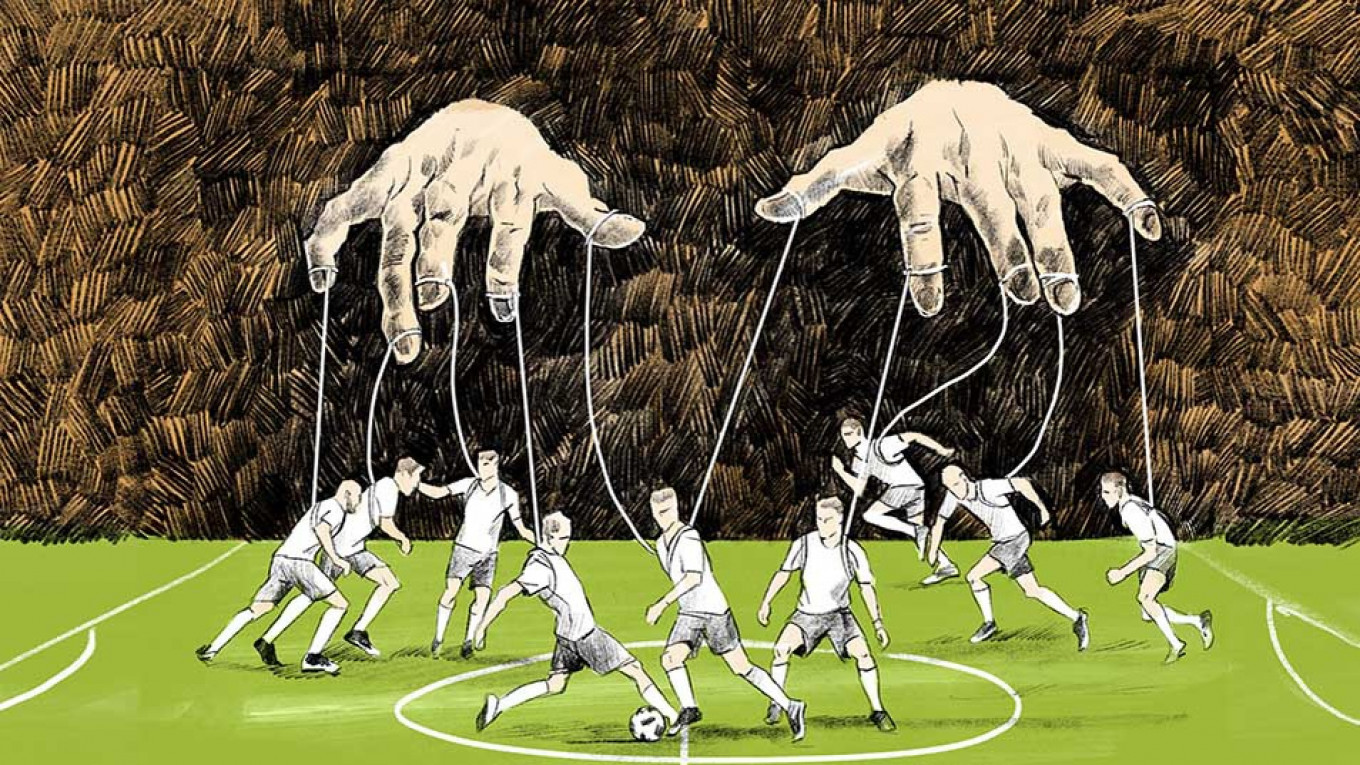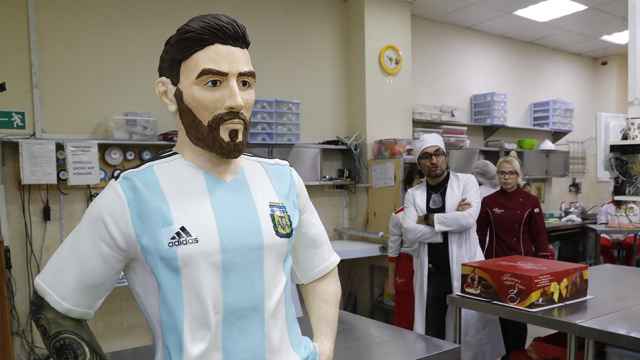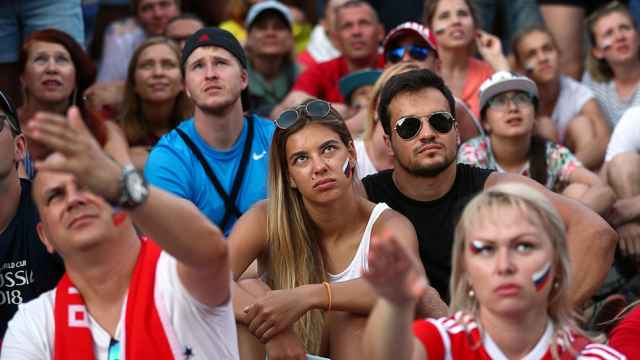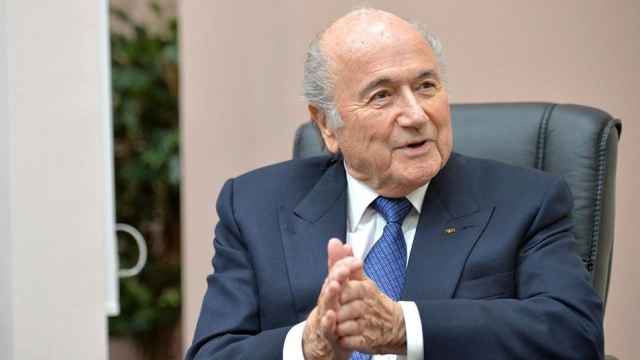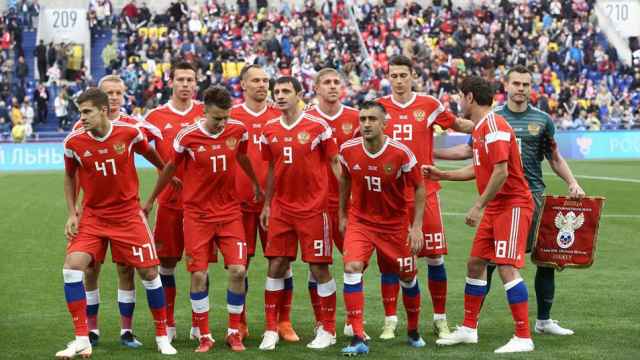A lucky draw, a freak handball, strange VAR decisions — the World Cup has been fodder for conspiracy theorists, many of whom suspect President Vladimir Putin is pulling the strings. Few Russians believed their side had any hope against Spain. The hosts were the lowest-ranked team playing in the World Cup, after all.
For most of the first half, Russia lagged 1-0. Then, relief came in the form of Gerard Pique’s hand. In the 41st minute of the game, the Spaniard raised his arm to block the ball and Russia was awarded a much-needed penalty. The rest is history: Russia scored and went on to win after a penalty shootout.
Spectators were aghast. “That’s absolutely idiotic from Pique,” a Newsweek journalist wrote on Twitter. “Gerard Pique gives the host country a hand,” the Peruvian Libero’s tongue-in-cheek headline read. On social media, many suspected money had changed hands.
Since Russia won its bid to host the World Cup, conspiracy theories have never been far away. A glimpse at social media paints a picture of a World Cup rife with match-fixing, substance abuse and, in some cases, even supernatural forces. In many tellings, Putin is personally pulling the strings.
Money Woes
At the draw in December, Russia was pooled with Uruguay, Egypt and Saudi Arabia in the World Cup’s weakest group. A social media storm ensued: “Group A is the biggest fix in World Cup history,” one Twitter user wrote.
The rumor mill did not stop there, particularly after Russia breezed through the group stage. While much of the country was cheering, a large part of the Runet was trying to find answers to the team’s success.
“Why did we wipe out Saudi Arabia? Putin personally asked the top Saudi to help [Russia] get off to a strong start. Why did we beat Egypt 3-0? It’s simple — the Egyptians lost so that Russians would start flying to Sharm el-Sheikh again,” a Sportbox.ru blogger summarized, fed up with the rumors.
Seen through the prism of the Cup, business deals struck off-pitch took on a new meaning. Shortly after Russia’s game against Saudi Arabia, attended by Crown Prince Muhammad bin Salman and Putin, the countries agreed to increase oil production.
And the week of the host’s semifinal against Croatia, Russian state banks struck a deal with Agrokor, a giant Croatian food and retail manufacturer — payment for a Russia win, commenters predicted. (Never mind that Russia lost.)
Rooted in truth
Some of the theories verge on science fiction. “This is how it works: A nano-magnetic grid is pulled over the ball. It is invisible to the naked eye,” a user called Lui Vega wrote on Facebook in a post shared almost a hundred times.
There was also a magnetic field around the goal area, operated directly by the Kremlin, the author argued. “Then no matter how often you aim, the ball will always fly past the goal — or, in the case of a positive field, you just need to kick it with enough strength and the field will draw it in.”
Some of the theories that circulated, however, tapped into truths. “Conspiracy theories are based on facts,” Ilya Yablokov, who researches Russian conspiracies at the University of Leeds, told The Moscow Times. “But these facts are heavily distorted.”
FIFA has been embroiled in multiple corruption scandals, and its denials have not been able to shake suspicions of widespread match-fixing. Meanwhile, allegations by the World Anti-Doping Agency of a state-sponsored doping program around the Sochi Olympics, combined with reports that Russian football players are running longer and faster than their rivals, have raised eyebrows.
This week, Süddeutsche Zeitung reported that Russian players could have been sniffing ammonia to enhance their performance. (Russia’s fitness coach Paulino Granero said in comments cited by Championat.ru that the theory was made up by “some idiot.”)
All-powerful
Many of the conspiracies involve the Russian president, including memes that show Putin controlling the VAR room. Or, in the words of the magnetic field blogger: “It’s clear: Putin lets those he likes win.”
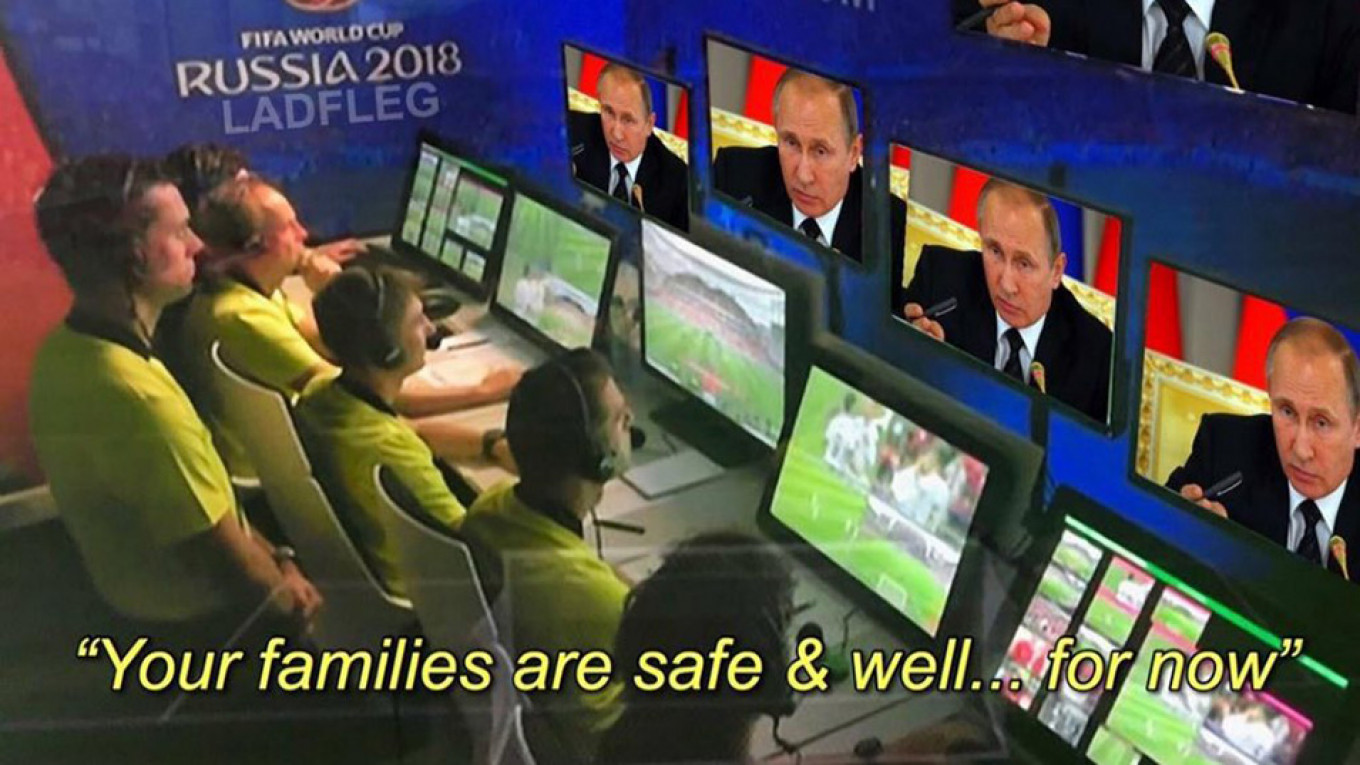
The prominent role given to the Russian president reflects how he is perceived in society, says Alexei Levinson, a senior researcher at the independent Levada Center. “Russians both completely trust and distrust the authorities,” he told The Moscow Times. “Nothing can be believed, and yet on the other hand, everything must have an explanation.”
The Soviet education system fostered a world view that encouraged conspiratorial thinking, Levinson added. “The idea was that we see one thing, but in reality there are forces and interests at play that are really influencing events that we cannot see with our eyes.”
Consequently, alternate theories surrounding the death of Tsar Nicholas II, the Soviet collapse or worries over “foreign agents” doing the West’s bidding in Russian society are rife. A poll conducted by the state-funded VTsIOM pollster in 2014, for example, showed that 45 percent of Russians believe the world is controlled by a global government.
Ironically, the conspiracy theories explaining Russia’s success have now themselves become the object of suspicion among Russians worried about foreign interference.
“I don’t know why people are surprised that the Russian team got this far, because at the end of the day we were playing very easy teams,” Andrei Kanchelskis, a former Manchester United player and now a coach, told The Moscow Times.
“I think for some countries it is convenient to spread these rumors about Russia for people to question the legitimacy of the World Cup.”
Includes reporting by Anton Muratov.
A Message from The Moscow Times:
Dear readers,
We are facing unprecedented challenges. Russia's Prosecutor General's Office has designated The Moscow Times as an "undesirable" organization, criminalizing our work and putting our staff at risk of prosecution. This follows our earlier unjust labeling as a "foreign agent."
These actions are direct attempts to silence independent journalism in Russia. The authorities claim our work "discredits the decisions of the Russian leadership." We see things differently: we strive to provide accurate, unbiased reporting on Russia.
We, the journalists of The Moscow Times, refuse to be silenced. But to continue our work, we need your help.
Your support, no matter how small, makes a world of difference. If you can, please support us monthly starting from just $2. It's quick to set up, and every contribution makes a significant impact.
By supporting The Moscow Times, you're defending open, independent journalism in the face of repression. Thank you for standing with us.
Remind me later.


